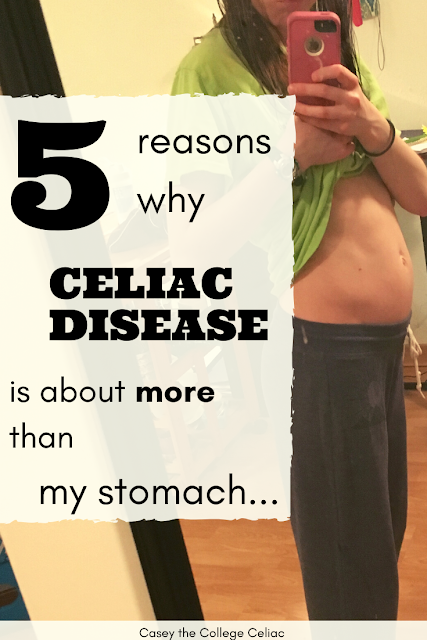5 Reasons Celiac Disease Is About More Than My Stomach
When you look up "what is celiac disease" online or receive a celiac diagnosis, it may seem like a simple disease at first. In fact, when I'm explaining my condition to new friends, I often just say, "Celiac disease is an autoimmune condition in which ingesting gluten damages the intestines."
However, in the seven years since my celiac diagnosis, I've realized something: the answer to "What is celiac disease?" can be pretty complicated...because celiac disease is about waaaaay more than just my intestines. Not sure what I mean? In honor of Celiac Awareness Month (and raising celiac awareness all year round!), here are five reasons celiac disease is about much more than my stomach.
1. The symptoms of celiac disease can manifest themselves in over 300 different ways.
It makes sense to think that a disease centered on intestinal damage would trigger symptoms related to digestion. And, in some dases, that assumption isn't wrong: for instance, my main symptoms of undiagnosed celiac disease were acid reflux, nausea and rapid weight loss.
However, stomach problems aren't the whole picture. In fact, symptoms of celiac disease can include:
- Anemia
- Anxiety
- Infertility
- Headaches or migraines
- Fatigue
- Discolored teeth
- Thin bones or being prone to broken bones
- Skin Rashes
and much, much more!
 |
| Source |
As a result, some people are diagnosed with celiac disease because they are underweight, bloated and have many stomach problems...but not everyone with celiac disease is thin or experiencing stomach issues.
2. The state of my stomach can drastically impact the state of my mind.
You've probably heard the old saying, "You can win a man's heart through his stomach." However, research has only recently discovered how much emotions are tied to the gut. This is called the brain-gut connection, and scientists have found that poor gut health can actually negatively impact people's moods. For example, people with IBS and gut problems to experience more anxiety and depression than expected on average, and an unhealthy gut has also been linked to conditions like chronic fatigue, ADHD, OCD, and Tourette syndrome.I've experienced first-hand how much my stomach problems and medically restricted diet can impact my mindset. When I'm going to a new restaurant with gluten free options or trying a new gluten free product that I'm still not sure will sit well on my stomach, I feel my heart rate increase and my hands start to get sweaty as anxious thoughts swirl through my mind. I think the isolation that can result from not being able to eat "normally" at college pizza parties or out with friends has also contributed to feelings of loneliness, and on days when I wake up randomly super bloated, I definitely have a harder time wearing a smile.
I don't say all this for pity or to suggest that having celiac disease means that I'm constantly anxious, sad or lonely. As I've shared in many posts, you can absolutely thrive with celiac disease and I have not let my gluten free diet hold me back from dating, going on outdoor adventures and eating at plenty of delicious restaurants. However, I do think it is important to make people aware of how much an "upset tummy" can really impact a person's day!
3. Social isolation is one side effect of celiac disease doctors don't warn you about.
Speaking of social isolation...a recent study found that restrictions can contribute to people feeling more lonely or isolated, and I get that. As the study points out, people commonly bond over food and sharing a meal...and when you can't do that, feeling like you belong can be a little bit more challenging.At least in my experience, this is one side effect of the gluten free diet (and life with celiac disease) that no doctor or nutritionist ever warned me about. After my celiac diagnosis, I was given advice on what foods to avoid and the best gluten free brands to buy, but I had no guidance for how to maintain social ties while turning down most of the food ever offered to me.
 |
| Source |
In the case of a social invitation where I know gluten-filled food will be involved, I typically:
- Eat before the event.
- Bring my own food.
- Call the restaurant (if applicable) to ask about gluten free options, and eat there if I can safely or follow step 1 or 2.
As it's clear to see, celiac disease is about much more than my stomach - it also requires plenty of thinking ahead and the use of a well-experienced brain. ;)
4. When I'm "glutened," more than just my stomach can suffer.
Just like celiac disease has plenty of different symptoms, people with celiac disease also experience different side effects of being "glutened" (or exposed to gluten) after going gluten free.
Personally, when I'm glutened, I typically don't feel the effects for a few days. Then, all of a sudden, I'll get extremely tired but also become unable to fall asleep, have massive brain fog and lose my appetite or have an upset stomach. It often takes me about a week to feel normal, and even longer to feel "good" (in terms of my stomach no longer being upset and having extra energy).
Beyond more expected side effects like vomiting or diarrhea, though, people with celiac disease can also experience gluten-triggered depression and fatigue, rashes, joint pain, migraines, blurry vision...I suppose you could say that no part of the body is safe.
5. Celiac disease has become a part of who I am - not just what my stomach is like.
But the biggest reason why celiac disease is about more than my stomach is simple: celiac disease is a part of ALL of me. As I've shared before, I don't make my chronic illnesses my entire identity. However, I think it is impossible to ignore how much celiac disease has shaped who I am today.Because of celiac disease, I am...
...a foodie and a big fan of experimenting with and trying new (gluten free) foods.
...an even bigger lover of planning ahead and sticking to a routine.
...not afraid to stand up for myself or others with invisible and/or chronic illnesses.
And those traits are why, in some moments, I am happy that celiac disease affects more than just my stomach.
What is one way you've realized celiac disease affects more than just your stomach? Or what is one way your medical condition affects more than what people might think? Tell me in the comments!






well, social events are definitely one thing. however the best feeling for me is when my friends try our family food and get excited about its taste. it’s like saying “you see? food is not only about stomachs, it’s also about taste. now have a great time at ‘poor you’s table” <3
ReplyDeleteYour dedication to sharing your personal experiences, tips, and recipes not only helps those with celiac disease but also educates others about the importance of gluten sensitivity and the need for gluten-free options. By documenting your journey as a college student with celiac disease, you have created a valuable platform for discussion, empowerment, and solidarity among individuals facing similar dietary restrictions. If you're looking for more resources on this topic, don't hesitate to explore and buy comparative essay to further enhance your understanding and advocacy efforts in the field of gluten sensitivity.
ReplyDelete